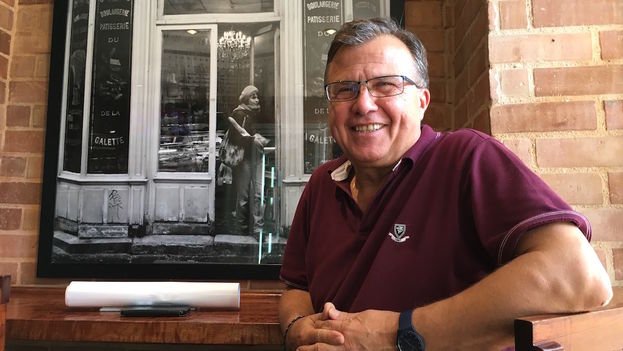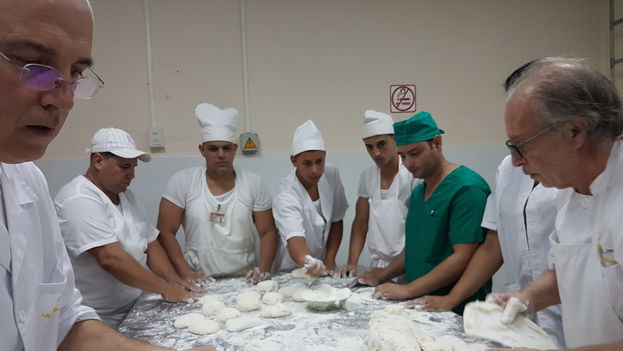
![]() 14ymedio, Luz Escobar, Havana, 20 November 2016 — The corner of Infanta and San Lazaro just awoke from its always busy Friday night. In the bakery of the El Biky restaurant, Carlos Bernabé tastes one baked treat after another. Faced with a delicacy filled with coconut, the demanding eater suggests “only the madeleine could be improved.”
14ymedio, Luz Escobar, Havana, 20 November 2016 — The corner of Infanta and San Lazaro just awoke from its always busy Friday night. In the bakery of the El Biky restaurant, Carlos Bernabé tastes one baked treat after another. Faced with a delicacy filled with coconut, the demanding eater suggests “only the madeleine could be improved.”
He says it knowingly, because the Spaniard comes from a family of bakers in Valencia and presides over the Indespan company. His excitement to explore new horizons has brought him to the island several times in the last five years. He says that the challenge here is to “encourage innovation in the bread and bakery sector.”
Barnabas takes a bite of his pastry and a sip of coffee. He explains that his firm has done innovated research “in the field of healthy baking.” Outside the windows of the café where he speaks with 14ymedio, the sun begins to shine through everywhere, defying the clouds and traffic.
Over a year ago the entrepreneur came to train and supply the employees of La Antigua Chiquita bakery, and he affirms that “since then, the bakery has exclusively dedicated itself to preparing breads and pastries for the celiac population.” Celiac is a disorder that obliges those who suffer from it to each gluten-free foods.
Barnabas boasts that the breads and pastries prepared under his company’s methods “become medication.” He evaluates the initiative that started at the bakery on Carlos III Street as “a resounding success” because “it is the first bakery in Cuba that offers good quality products for celiac sufferers,” and that has been able to maintain a stable supply of products.
The businessman has not wanted to stay only in Havana and the project is expanding to other provinces. On his most recent trip he helped to “set up the second gluten-free bakery for celiacs,” now in Santa Clara. In this effort he was accompanied by two bakers from his team in Valencia.
This type of preparation “was totally unknown” to the Cuban employees, but after three days of practice “they know how to make different kinds of products such as breads, hamburger buns, pizzas, cakes and muffins,” says Indespan’s president.

In these last five years, while promoting his ideas on the island, he has been approached at his presentations by everyone “from crying children” to “mothers of adult children who were finally able to eat warm bread.” He found that many felt socially excluded because at parties and recreational activities “all the sweets contained flour, contained gluten,” which is dangerous to their health.
Last Friday Barnabas did a demonstration at El Sylvain on Calzada de 10 Octubre in Havana in which he made breads and desserts for diabetics, “with zero sugar,” he says.
He explains that in this effort to introduce formulas and methods for healthy eating in Cuba, he has found “great support” and “those responsible for the bakeries are very concerned about it.” He maintains “a fluid conversation with all those involved so he doesn’t run out of supplies,” and in order to avoid “celiacs not having their food, their medicine.”
The baker is not done in terms of projects. He plans to increase the variety of products and on his next trip will bring “gluten-free pasta so celiacs can make spaghetti, cannelloni and lasagna at home.”
He estimates that there is a need for more than “five hundred bakeries of this type” throughout the country to satisfy the demand. “The important thing is to start on the path and then offer the facilities necessary for the self-employed to be able to continue,” he says, in relation to the private sector.
However, to achieve this “the most important thing” is “to improve the supply of raw materials.” In his conversations with Cuban entrepreneurs he has learned that “their main problem is supplies,” stable supplies “to make bread for diabetics or to get mixes.”
There needs to be “in the very near future, a way for private individuals to get the raw materials necessary to give the population a quality product,” Bernebé emphasizes. Having a wholesale market still seems like a dream, but even though the projects are “going slowly” the baker believes that “we have to keep pushing.”
